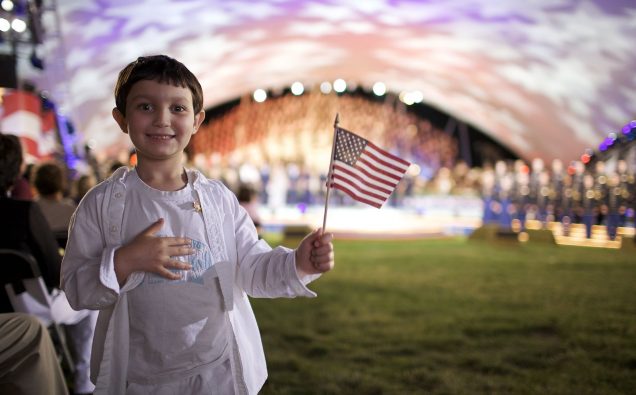
At Massachusetts, in the Boston area, I happened to accompany a participant to a high school reunion. There, at one event, the town historian delivered an informative lecture on what is believed to be the oldest complete flag in the United States.
According to tradition, the Bedford Flag was carried into battle by local residents confronting British troops at Concord Bridge, on April 19, 1775, in the opening stages of armed resistance against British rule. The painted silk flag depicts an arm holding an uplifted sword and an inscription in Latin proclaiming “Conquer or Die.”
The flag is preserved in a humidity-controlled locked room at the Bedford public library, where visitors come to peer at it.
The flag instills and reaffirms pride in national solidarity and heritage.
The United States constitutes 50 states but the American flag is ubiquitous. It flies over hotels, colleges, roads, libraries, shops, and plenty of private households. Flying the flag is supposed to bring a sense of belonging. You don’t have to be a VIP to have a flag on your car or home. Any person can show it. Its display is an equal expectation of many and by no means an elite privilege reserved for the fortunate few. Its multi-dimensional use has helped reinforce a sense of national coherence, despite the ethnic diversity of the populace.
The respect for the flag was an instructive reminder about the status and display of national colors in Pakistan. The Pakistani flag is distinguished by being perhaps the most instantly recognizable. Yet, in parts of Pakistan, it is dangerous sometimes even to display the flag, with 5th Column elements openly operating to rip apart the national fabric. In one word: ingratitude. The much-touted 18th Amendment, in effect, may work to segment the nation, when the compelling imperative is to cement it.
Taken for granted is what has been handed over on a platter. Sometimes, the sense of exploitable victimhood is so overwhelming that it has a blinding effect, blocking self-examination of one’s own flaws. It is easier to point fingers elsewhere.
Refreshing it was to see during the reunion how old bonds were reconnected and how the spirit of togetherness forged through shared memories of the past remained intact amidst dashed dreams and personal loss. In the modern era of transactional relationships, mostly driven by an underlying utilitarian impetus, it was instructive to witness elements of common purpose and steadiness despite the vicissitudes of life.
One participant succinctly explained: “It doesn’t matter if in high school we were in different cliques, had different interests or barely knew each other. Somehow just the fact that we were ‘together’ at the same age, at the same time and at the same place during those so important years of our lives solidified a connection. That would have not been possible without the passage of time and periodic reunions.”
Reunions work as an expression of gratitude for unbroken human connections. It proves that, whether it is the national spirit or the human spirit, it is never too late to rejuvenate.
For hope and optimism, the flag has to be kept flying.











